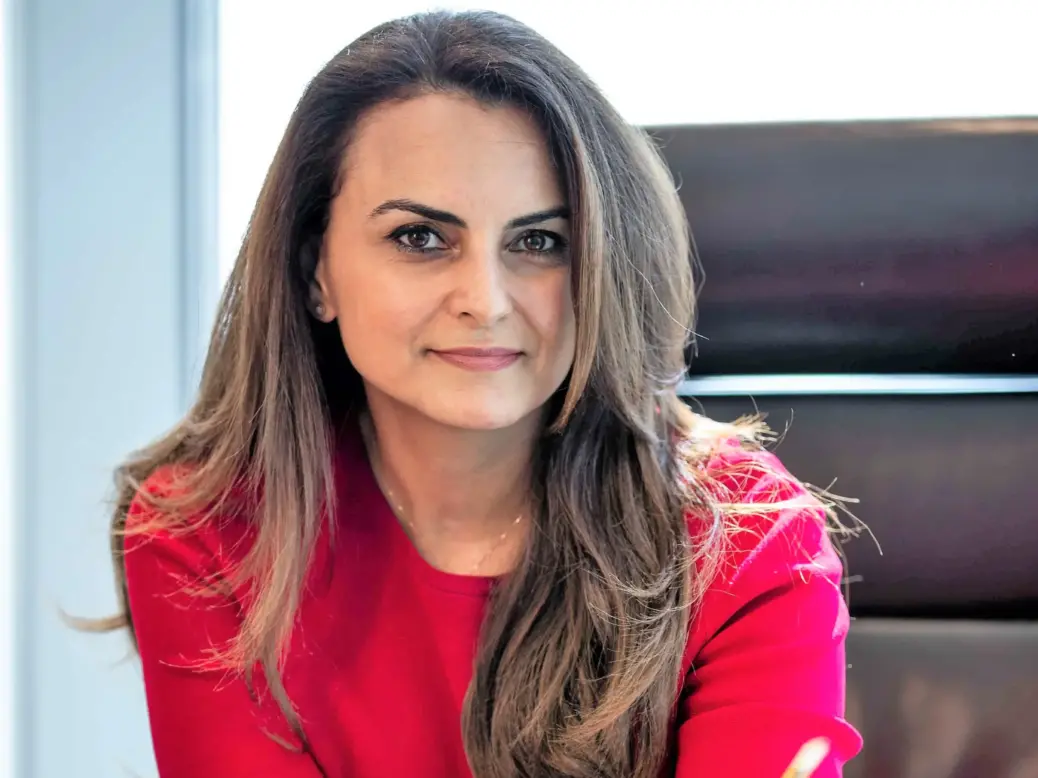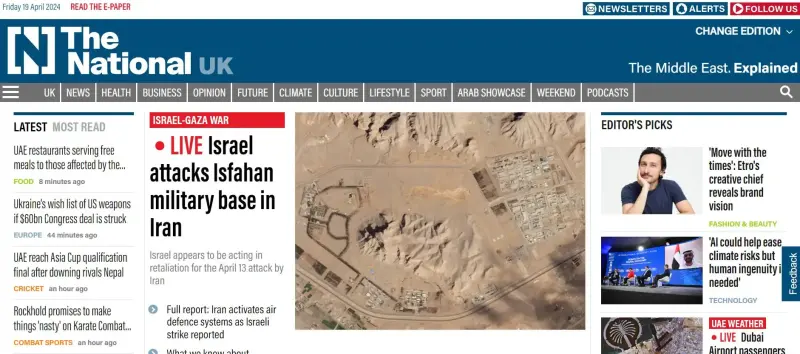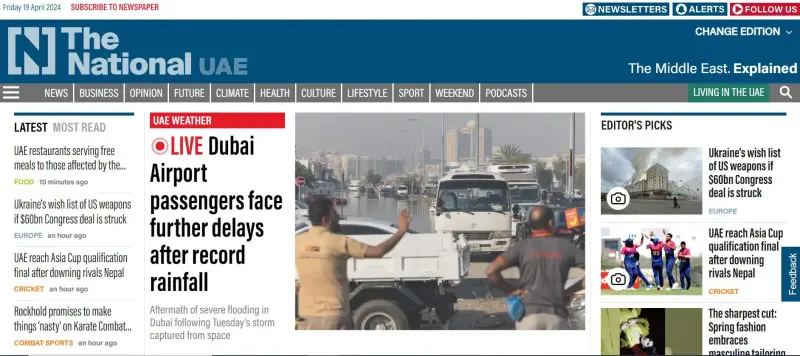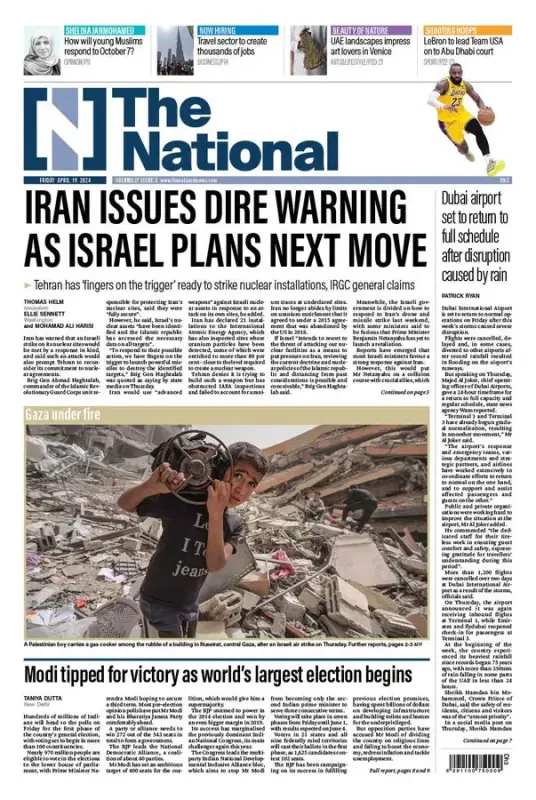
The editor of The National has said it is “frustrating” and does a “disservice” to her journalists to suggest the newspaper is a mouthpiece of the UAE government.
Mina Al-Oraibi told Press Gazette criticism of the newsbrand’s ownership unfairly writes off its journalism, which she said “speaks for itself”. She noted it was shortlisted for International Newspaper of the Year at the UK’s Newspaper Awards this year.
The National, which has a tagline of The Middle East Explained, is aimed at a core audience of English speakers, usually well-read professionals including decision-makers and policy-makers, who have an interest in the Middle East for any reason.
The newsbrand currently has 194 journalists in total, including 20 in its London bureau. Its website received 6.7 million visits in March, according to Similarweb.
The National is owned by International Media Investments (IMI), which has drawn attention for its attempt to buy The Telegraph in the UK alongside US private equity firm Redbird.
Its takeover, which circumvented the official auction process by coming to an agreement with former owners the Barclay family to repay their debts to Lloyds Banking Group, has seemingly been thwarted by the UK Government introducing legislation to ban foreign government ownership of newspapers. The sale process is expected to restart soon.
The National was founded in 2008 by UAE government-owned Abu Dhabi Media with a host of Fleet Street journalists recruited to get it off the ground, including former Daily Telegraph editor Martin Newland.
In 2016 it was sold to IMI, which is owned by UAE vice president and deputy prime minister Sheikh Mansour bin Zayed Al-Nahyan, brother of the current president.
Soon after the Telegraph deal was revealed, the Financial Times reported that although The National has a reputation as “one of the most professionally produced publications in the Middle East” it is “seen as a mouthpiece for Abu Dhabi’s worldview”.
The National editor: ‘It’s easy to write us off because we operate in a different environment’
Speaking to Press Gazette during a trip to London this month, Al-Oraibi responded to this commentary for the first time.
She said: “The term ‘mouthpiece’ is one that is always used in a derogatory way and you feel like it’s a shorthand that people then write off all the journalism that you do. And it is frustrating, primarily because I feel it does such a disservice to our journalists on the ground.”
People often wrongly assume that The National’s editorials have to reflect the UAE government position, she said, explaining that instead the newspaper’s view on issues is decided only by four or five people sitting in a room together and it is “purely owned” by them.
“There is no intervention whatsoever from the day I became editor until now, that was something that I was very careful about and found really important and it’s something I’m very proud of,” Al-Oraibi continued.
“And I feel like it’s easy to write off outlets that come from the region because we definitely operate in a different environment.”
Al-Oraibi, an Iraqi-British journalist who has also lived in the US, pointed as an example to US newspapers that claim they are objective: “I don’t think anything’s objective… So are we subjective? Yes. Because I think everybody’s subjective.
“Do I have to take into account what people in the UAE [will think], be it government or people who advertise with us or how much access I’ll have with someone? Yes, I take that into account like every editor does. And for me, it’s always about, with anybody I interview or anybody my team is writing a story on, how much do we want to annoy them if it’s going to limit our access?”
Al-Oraibi continued: “So all of that is at play. But this idea that our journalism for some reason is lesser, I genuinely don’t accept, and I’m happy to have that conversation and challenge people and say read The National, and I don’t want it to sound like a cop out but genuinely our journalism speaks for itself.”
The UAE sits in 145th place out of 180 on the Reporters Without Borders World Press Freedom Index. The charity notes that “most Emirati media are owned by press groups with ties to the government” and that “authorities can censor media content deemed to be overly critical of policies, the ruling families, religion or the economy”.
But Al-Oraibi said of the ranking: “I genuinely don’t think we would have the newsroom we have, and the people who work with us, if we weren’t able to do our jobs. I don’t think people feel threatened. I think journalists globally are threatened. I think there’s a global problem we have to talk about and it’s a very serious problem…
“Before, you’d write an article in the newspaper, somebody would see it, they’d be annoyed about it for a day or two, and then it would pass. And now we get people complaining about something we’ve written six years ago and threatening legal action… but I don’t in any way, shape or form think that we are under threat for being in the UAE that is different from being a journalist anywhere in the world now, where I think journalism is under constant pressure and in some parts of the world is really in danger and I don’t think that’s the case at all in the UAE, genuinely.”
Unusually The National does not have to make a profit as IMI gives the newsbrand funding to continue operating based on it reaching certain performance indicators.
Revenue comes from print advertising (from the weekday newspaper and luxury magazine distributed with it ten times a year) as well as some programmatic advertising, sponsored supplements and other editorial partnerships.
The National’s ‘four phases’ since 2017
Al-Oraibi, formerly assistant editor-in-chief at London-based Arab international newspaper Asharq Alawsat, joined The National in 2017 to lead its relaunch under IMI’s ownership.
The initial job involved leading its "late conversion" to a digital-first model and getting the right team in place to do so, although the "vast majority" of the existing staff were kept. Previously there was a digital team of ten to 15 people and everyone else was working towards print deadlines.
After that, she said, the next phase was a focus on infrastructure and getting digital right, including a change of CMS.
Next began a focus on expanding The National's reach, with the appointment of many of its international correspondents and creation of several bureaux outside Abu Dhabi.
The most recent phase, which began around 18 months ago, is a focus on building The National's core audience and what will make the newsbrand stand out.
Al-Oraibi said: "It's going to be original journalism. It's going to be living up to our tagline of the Middle East explained. And so original journalism based on known correspondents who are going to get you stories and really carve out a place for The National to tell stories that otherwise weren't being told - stories that we thought mattered, that were on mission, but also that interested people."
The realisation that a strategy change was needed came after the Covid-driven traffic peak began to fall away, exacerbated by the fall in referrals from search and social hitting much of the industry.
Al-Oraibi said the newsroom had to "hone in on our exclusives, our original reporting" but this meant they had to change their mindset and accept they could not cover everything.
"I have one correspondent in Jordan, I can't expect him to tell me every [thing that happened] in Jordan and still work on scoops and exclusives. It was unfair, we had really stretched people. I had stretched people, I own that.
"So it was a sense of okay, well, we're not going to cover every story, we're going to consider and take more time making decisions. And that's really what we started doing from January. So this is a new publication strategy," she said, adding: "I always say to the team you won't read everything in The National, but everything you read in The National is going to be accurate, brilliant, and the best story that you can get out there.
"So how do you get into that discipline? Conscientious journalists find it really hard to say 'I'm going to leave that story'."
Why the UK is an important base for The National
The London team, which includes homepage editors, social media journalists and a picture editor, takes part in three editorial meetings daily with the main newsroom.
London is important to The National, Al-Oraibi said, for several reasons. "The first is the UK is a really important story globally both from politics, geopolitics, its relationship with the Middle East, immigration stories... so I wanted to make sure we covered it well."
In addition The National is seeking audiences not only in the Middle East but those elsewhere who have an interest in the region and an appetite for information about its politics, investment and culture, she added.
Having a strong presence in London and Washington DC also helps The National maintain 24-hour coverage rather than relying on overnight shifts in Abu Dhabi.
The National has chosen to be IPSO-regulated in the UK because, Al-Oraibi said, "we see ourselves also as being part of the fabric of the media industry here and I think it shows that we take these things seriously".
The National has six regional website editions - for the UAE, the Gulf, Middle East North Africa, US, UK and 'international' - and Al-Oraibi wanted to move away from, for example, British visitors being shown the UK edition and therefore all the big British stories, which they probably already read from a legacy UK newsbrand.

Recalling her own media habits from when she lived in the UK, Al-Oraibi said: "Frankly, we're never going to be someone's first point of call. We're always going to be [the one you go to] if you're interested in the bigger story, if you're interested in what's happening elsewhere.
"You want to be sure that you're part of someone's media intake every day or media diet every day, and that you're on there among those outlets that they must check every day, but it doesn't necessarily have to be their first port of call because if I'm in the UK, I'm going to go to the BBC first - or whatever political affiliation I have to whatever outlet but when I was living here, I'd always go to the BBC - and it didn't matter that I was interested in the States or the Arab world, that will always come second."
In the UAE itself, Al-Oraibi compared The National's role to The Washington Post in the US. "When you live in Washington, you have to read The Washington Post [for] the weather and the garbage collection and everything else. But when you leave Washington, you have to read The Washington Post to understand the political view that's happening there.
"And we're the same, so if you live in the UAE it's very helpful to have The National because we have a local edition that's very much like the weather and things like that. And then there's a bigger picture, which is our international edition and there's a lot of crossover, but it's what you first come to when you go to The National - do you want the UAE kind of local stories or do you want the more Middle East regional/international."

Within the next few months The National will undergo a website redesign and the launch of a new app to rectify the fact that currently The National's app cannot show video. An expansion of video is also underway, but with a focus in particular on the newsbrand's own platforms rather than platforms like Tiktok and Instagram Reels.
Newsletters are another current focus while Al-Oraibi expects to add more in-person and online events to interact directly with the audience.
Al-Oraibi is also planning to introduce registrations on the website to get to know The National's audience better and receive more first-party data, although she has not yet decided whether it might be a metered or hard wall before people are asked to sign up.
This will mean, she said, the team asking "What's the value proposition? Why do you care to register and give us your information? What are we offering you? So really being more harsh on ourselves that you can't just go for a catchy headline or an SEO headline - making sure it's of value."
'Nostalgic attachment' for print is not a business case
The National still puts out a print newspaper each weekday in the UAE, although with all the changes since 2016 Al-Oraibi said this was something that had been under consideration.
She admitted to having a "nostalgic attachment" to print newspapers but said this is not why it is still going, saying that is not a business case. Instead, she said, print advertising "still makes up a big part of our revenue" while significant revenue also comes from its luxury magazine.
"We find that it's a very powerful channel with our core readership in the UAE," Al-Oraibi said. "And also we like having something physical to show off what we do, because digital readership is like 99% of our readership, the print is minimal, but at key moments people want that souvenir front page and I find that that gives us a grounding and a discipline that actually would be harder to maintain if we didn't have it."

But she added: "I think that the future really is magazines rather than a daily paper, because it's just too hard to get through a daily paper for most readers. But those who like it are very attached to it."
Having only a weekday edition may sound counterintuitive to newspaper readers in countries like the UK where circulation for many of the nationals on Saturdays eclipse their Monday to Friday counterparts.
But there is a different culture in the UAE, Al-Oraibi explained. She arrived in Abu Dhabi with her own "biases" and decided to "double down" on the weekend and introduce a new supplement - but it wasn't picked up because a lot of The National's professional audience got the newspaper to their office rather than their homes and only read it on weekdays.
The weekend edition was permanently closed during the Covid-19 pandemic with dedicated digital weekend content produced instead. Al-Oraibi said that "was our way to compensate for not having a weekend edition, which I miss but it made no business sense".
With the plans Al-Oraibi is putting in place for the next phase of The National she feels "optimistic because I feel like we have a clear vision of where we want to go. It's taken time. I wouldn't have said the same thing a year ago. But I feel optimistic because I feel like we know where we want to go and we have the right team and we also have good partners that we're working towards that."
However, she feels less optimistic about "the general media literacy situation globally" and "the fact that most people are getting their news through random video clips that nobody knows what the source is, shared by somebody they trust".
"I'm very concerned and not very optimistic - actually I would say I'm quite pessimistic - that we have this fragmentation and disinformation deluge that is very hard to get a handle on.
"I genuinely think the way that it's going to get solved is you start at schools and how you're teaching kids to understand what they're reading and holding the tech companies that carry these things to account, and journalists have to do their role too to make sure that what we're producing is good enough to get people's attention the way that some of this other nonsense gets picked up."
Email pged@pressgazette.co.uk to point out mistakes, provide story tips or send in a letter for publication on our "Letters Page" blog
